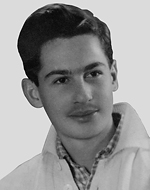Son of Berta and Abraham. Born on 25.5.1928 in Ein Harod, brother to Rachel and Arnon, Uriel’s parents were among the first of Afula, and lived there with his older sister Rachel before he was born Uriel was born in a hospital set up by pioneers of settlement in Ein Harod. With his mother Bertha directly to Moshav Merhavia, to which the family moved at the time, because they did not find a suitable place to live in Afula, and his father and his first friends in kindergarten and in the first grades of the school in Moshav Merhavia, Uri was curious and playful in his childhood, loved to sing and later wrote Yaffa songs, some of which were even published in the Ghetto “In 1934, after the birth of his brother Arnon, the family returned to Afula, and Uri began to study at the Mizrachi school, the only one in the small town of Afula, then moved to the village’s children’s school. In his youth, the Second World War broke out and foreign soldiers arrived in Afula on their way to the front, where the New Zealands set up a large tent camp for a long period of time, and being very friendly, they were connected to the families of Afula. Uri met David Rovertson and invited him to his home. David, a tall, huge guy, made warm contacts with the Beck family, connections that had been preserved for many years after Uriel’s death, and until the day David died. David embarked on a decisive battle against the Germans in El Alamein in the Western Desert. On his return to the holiday, he brought Uri’s father a revolver as a gift, and soon Uri learned to handle the gun and became a confidant. With the end of World War II in 1945, Uri began to concentrate the branch of Hanoar Haoved in Afula, and many of his students and admirers were at that time. During those years, the youth were connected to the Hagana organization, and of course Uri’s part was with them. The magnitude of the disaster that engulfed the Jewish people during the Holocaust and its extent caused the young people to work within the framework of the underground organizations with the aim of establishing a Jewish state in the Land of Israel. After a few months, at the beginning of 1946, he worked at a Tel Aviv printing house that printed the Haganah publications, and his uncles in Rishon LeZion hosted him and gave him great love. , Joined new friends and friends, and shared them with the songs he wrote in his Yaffa and well-ordered handwriting.In the time of the “Saison,” Uri, as a member of the Haganah, was severely beaten in a Tel Aviv alleyway and his father was summoned there, To the “Notar” Jewish settlement police stationed at the training camp at Kibbutz Ginegar After the proclamation of the United Nations General Assembly on the partition plan of the Land of Israel “In the Battle of Beit Keshet Uri wrote the song” His Last Way “:” Not weeping, not telling, / In the morning watch / Still walking the rows; / The pain is sharp, burning, / a human Lev – an unquestionable secret … / The tears fall out of it. In the days of the darkening darkness, there is no talk, the arms are raised – / ‘Fire!’ – Three shots and the cutting / the eulogy are the tears, the tears … // The first shot – the birth of a man; (2) the days of Herut; The third declares the sanctity of the blood, because the people in which he bought freedom! “On February 1, 1948, a year before he was drafted into the police, he was automatically sent to the Israel Defense Forces in the future state.In a liaison course in Bethlehem of Galilee, he arrived at the unit’s headquarters in Kfar Gideon. Later he was stationed at the headquarters of the 13th Battalion in Kiryat Amal (today part of Kiryat Tivon). There, at the end of 1948, after exhausting activity, he was struck by an illness from which he never recovered. During his hospitalization at the “10” hospital in Haifa, he wrote the song “Vidui”, which was composed in 1991 and was sung by the Central Command Group: “You / as a dream that was and gas, like the bird of sparrow, As a burning ember of fire, / In the depths of the Lev stirring, / Like the waves of the sea, You are stirring up! // In the light of the sun, I will light my life, You shall remember me, / You shall know all my life. “In the winter of 1949, towards the end of the War of Independence, Uri was sent home and continued to show optimism despite his difficult situation. He again gathered around him many friends and friends, this time also members of Hanoar Haoved. But in the summer of 1950 he was overwhelmed and died of his illness. Corporal Uriel Bek fell during his service on July 21, 1950, at the age of 22. He was buried in the civilian cemetery in Afula. Our brethren are weeping for you, Rachel and Arnon. “
